Traditional Poster
RF Light
ISMRM & ISMRT Annual Meeting & Exhibition • 10-15 May 2025 • Honolulu, Hawai'i

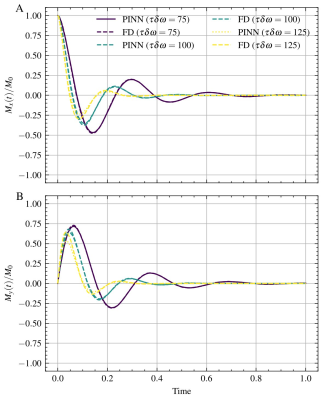 |
4970. Simulation
of spin dephasing in arbitrary Larmor fields using
physics-informed neural networks
L. Rotkopf, H-P Schlemmer, C. Ziener
German Cancer Research Center, Heidelberg, Germany
Impact: By accommodating complex susceptibility
distributions and geometries, our PINN-based framework
enhances the simulation of MRI signal dynamics in tissues
with varying properties—such as hemorrhages, amyloid
deposits, iron accumulation, and vascular
malformations—offering significant clinical relevance.
|
|
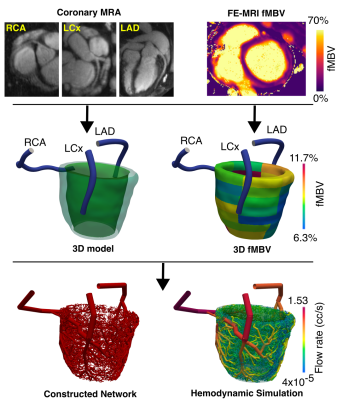 |
4971. Hemodynamic
Simulation of Coronary Microcirculation using
Ferumoxytol-Enhanced MRI Fractional Myocardial Blood Volume Maps
M. Mahmoudi, A. Pogosyan, A. Arzani, K-L Nguyen
University of California, Los Angeles, Los Angeles, United States
Impact: The proposed framework facilitates non-invasive,
patient-specific hemodynamic modeling that is critical to
the diagnosis and management of ischemic heart disease
(IHD). Its reproducibility, accuracy, and potential
adaptability provide a foundation for MRI-based in silico
diagnostics to transform personalized cardiovascular care.
|
|
 |
4972. In-silico
modelling of placental T2* MRI: impact of oxygenation and
villous architecture
D. M. Cruz de Oliveira, Z. Yang, A. Clark, J. James, A.
Pennington, D. Adebo, S. Kersley, L. Story, K. Payette, J.
Hajnal, J. Hutter, M. Darrow, G. Poologasundarampillai, J.
Naish, K. Duhig, A. Heazell, R. Shipley, D. Alexander, P.
Slator
University College London, London, United Kingdom
Impact: The simulation of placental T2* in realistic
fetoplacental vasculatures disentangles oxygen/vascular
abnormalities and their effects on placental function. By
integrating structural and oxygen dynamics, we aim to
improve early detection and understanding of placental
dysfunction, thereby facilitating treatment.
|
|
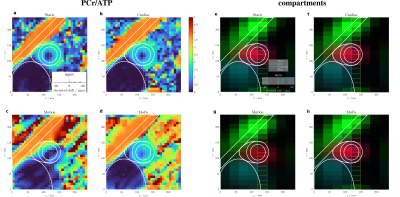 |
4973. Evaluating
the Impact of Anatomical Motion on Cardiac 31P MRSI with a
Deformable Digital Phantom
S. Wampl, L. Kiss, A. Schmid
Medical University of Vienna, Vienna, Austria
Impact: This simulation framework provides researchers
with a tool to evaluate and optimize cardiac 31P MRSI
protocols, paving the way for improved motion correction
techniques that could refine in vivo measurements and
metabolic assessment in clinical cardiology.
|
|
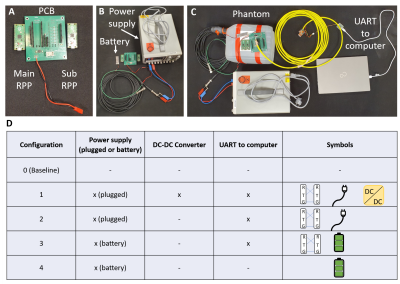 |
4974. Microcontrollers
in the MR scanner: An in-depth characterization of the
performance tradeoff
J-L Gnanago, J. Moosbrugger, L. Nohava, M. Hofbauer, R.
Frass-Kriegl
High Field MR Center, Center from Medical Physics and Biomedical Engineering, Medical University of Vienna, Austria, Wien, Austria
Impact: This work presents an in-depth characterization
of the mutual impact of microcontrollers and MR imaging.
Lessons learned from these experiments will help the future
implementation of setups employing microcontrollers, e.g.
operation of sensors and actuators.
|
|
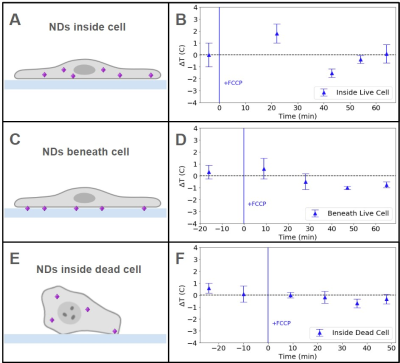 |
4975. Optically
detected magnetic resonance based thermometry using nanodiamonds
implanted in living cells
J. Consiglio, R. Boltyanskiy, K. Keshari
MSKCC, New york, United States
Impact: In addition to being a stepping stone to a
better understanding of intracellular thermal properties,
the methods developed in this work can also be applied to
studying the interplay between temperature and cancer
metabolism.
|
|
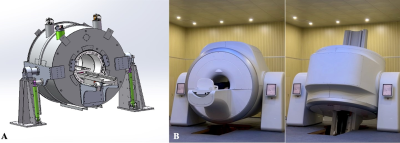 |
4976. Development
of a Rotatable 1.5 Tesla Whole-body MRI Scanner for
Multi-orientation Imaging
J. Zhu, C. Wang, J. Zheng, Y. Ge, J. Xu, P. Liang, P. Dai,
W. Yao, Q. Wang, B. Chen, J. Zhang, J. Li
Xingaoyi Medical Equipment Co., Ltd, Yuyao, China
Impact: The development of a high-performance
multi-orientation 1.5 Tesla MRI system enables the
examination of human anatomy and physiology under varying
gravitational influences. This novel scanner holds
significant potential for both basic biomedical research and
clinical disease diagnosis.
|
|
| 4977. WITHDRAWN | ||
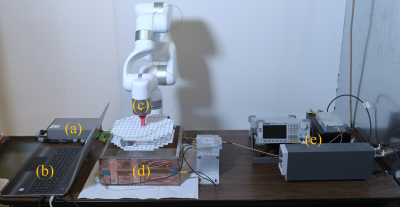 |
4978. An
Automated Validation System for Active Implantable Medical
Device (AIMD) Model under MR RF Field Exposure
Z. Zuo, A. Shen, F. Ebrahimi, Q. Wang, H. Jeong, A. Kumar,
J. Chen
University of Houston, Houston, United States
Impact: A cost-effective and yet more accurate AIMD
model validation system/method is developed following ISO
10974 standard. Compared to the traditional birdcage coil
validation method, this system requires less labor, lower
cost, and has lower systematic error.
|
|
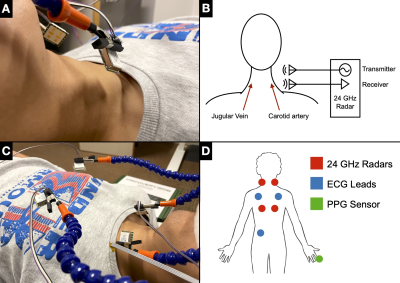 |
4979. MM-Wave
Radar Vitals Sensing: Towards Non-Contact Cardiac and
Respiratory Gating for MRI
H. Arora, F. Robb, S. Vasanawala, J. Pauly, G. Scott
Stanford University, Stanford, United States
Impact: MM-wave radar is a promising candidate for
non-contact sensing of cardiac and respiratory cycles, with
potential applications in non-contact motion gating in
pediatric MRI and synchronizing on pulsatile motion of the
cerebrum in neuroimaging.
|
|
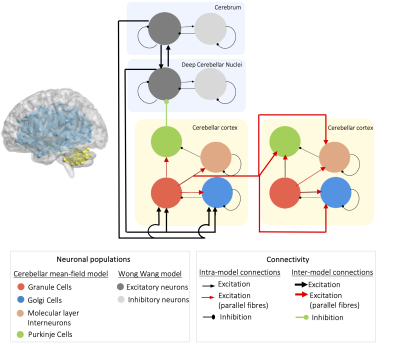 |
4980. Region-specific
models integrate microscale properties into BOLD signals
simulation: the rise of the Hybrid Virtual Brain
R. Lorenzi, C. Casellato, C. Gandini Wheeler Kingshott, F.
Palesi, E. D'Angelo
Università di Pavia, Pavia, Italy
Impact: By
integrating region-specific model technology, the Hybrid
Virtual Brain enhances BOLD simulations and captures
brain rhythmic oscillations. Its application to neurological
diseases will enable the reproduction of altered brain
rhythms, fostering the generation of an effective brain
digital twin.
|
|
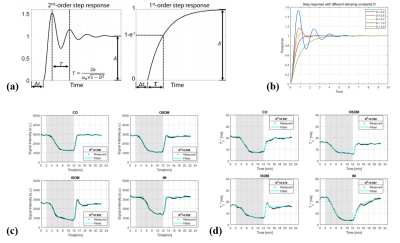 |
4981. High-temporal-resolution
dynamic EPI at 9.4T for monitoring renal oxygenation in rats:
Responses to hyperoxia and hypoxia
S. Sun, K. Zhao, Q. Tao, Q. Hu, Y. Feng
School of Biomedical Engineering, Southern Medical University, Guangzhou, China
Impact: Dynamic EPI can effectively monitor the changes
of renal oxygenation and may be beneficial for renal injury
detection.
|
|
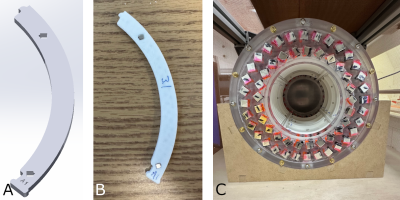 |
4982. An
open-source shim generation workflow for permanent magnet MRI
systems
S. Ogier, G. Shakar, R. Rojas, S. F. and the Utrecht OSII
Team, T. O'Reilly, K. Keenan, J. Harper
National Institute of Standards and Technology, Boulder, United States
Impact: An open-source workflow was developed to
streamline the design of permanent magnet shims for
low-field permanent magnet scanners. This will make
shimming, one of the most challenging parts of permanent
magnet construction, easier and more accessible.
|
|
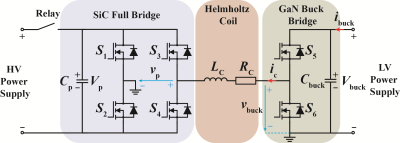 |
4983. Novel
Pulsed Electromagnet Design with Wide-bandgap Power
Semiconductor for Low-field Portable MRI System
A. Yang, L. Gu
University of Pennsylvania, Philadelphia, United States
Impact:
This abstract present a novel hybrid main field driver structure designed for electromagnets in portable MRI systems. The circuit leverages the latest wide-bandgap power semiconductors and features small size, light weight, efficient energy utilization, and high controllability. |
|
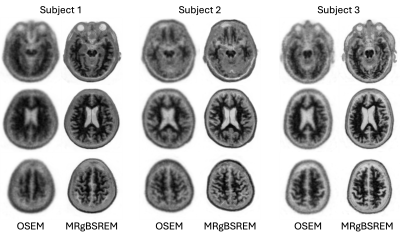 |
4984. Enhancing
the Diagnostic Accuracy of Amyloid PET: The Impact of MR-Guided
PET Reconstruction
M. Khalighi, C. Young, S. Weiss, M. Zeineh, G. Davidzon, E.
Mormino, G. Zaharchuk
Stanford University, Stanford, United States
Impact: Given how common inconsistent ratings are for
amyloid-PET, methods that improve the ability to distinguish
intermediate amyloid levels may be valuable for the
widespread use of this modality.
|
|
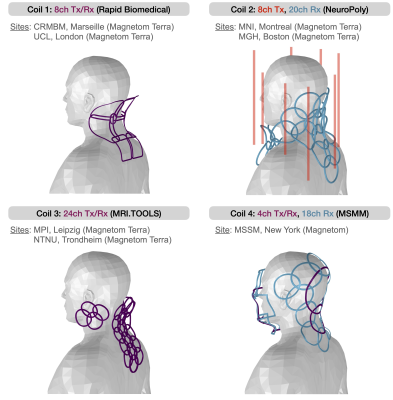 |
4985. Multi-center
benchmarking of cervical spinal cord RF coils at 7T: A traveling
spines study
E. Alonso-Ortiz, D. Papp, R. Barry, K. Poëti, A. Seifert, K.
Gilbert, J. Paska, F. Eippert, N. Weiskopf, L. Beghini, N.
Graedel, R. Trampel, M. Callaghan, C. Aigner, M. Seif, P.
Freund, A. Destruel, V. Callot, J. Vannesjo, J. Cohen-Adad
Polytechnique Montreal, Montreal, Canada
Impact: A harmonized quality control protocol can help
the community expedite the coil development process. Our
comparative analysis of four SC RF coils serves as a guide
for selecting an appropriate coil and for the design of
future coils.
|
|
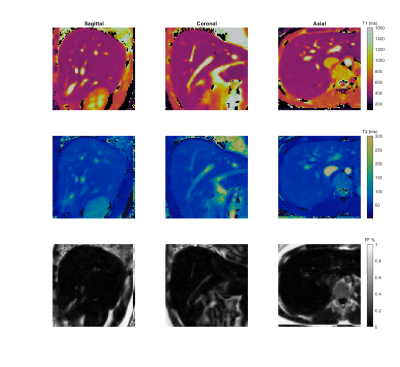 |
4986. High-resolution
highly-accelerated free breathing 3D joint T1/T2 and fat
fraction mapping of the liver at 0.55T
F. Ercoli, D. Si, M. Crabb, N. Garrido, K. Kunze, C. Prieto,
R. Botnar
Millennium Institute for Intelligent Healthcare Engineering (iHEALTH), Pontificia Universidad Católica de Chile, Santiago, Chile
Impact:
High-resolution free breathing 3D joint T1/T2 and fat-fraction mapping of the entire liver is feasible in a single scan of 8 min at low-field and may enable more affordable and comprehensive assessment of liver disease. |
|
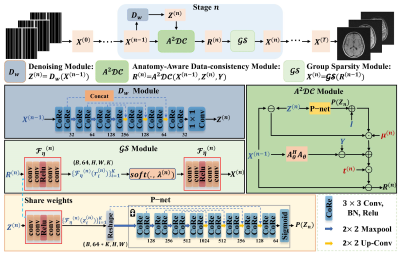 |
4987. Towards
Accelerated Low-Field Multi-Contrast MRI with Anatomy-Aware Deep
Unrolling
Y. He, F. Wang, F. Ju, R. Xiao, c. lian, J. Ma
School of Mathematics and Statistics, Xi'an Jiatong University, Xi'an, China
Impact:
The A2MC-MRI offers a promising approach for fast MC-MRI reconstruction with enhanced task-specific imaging quality, particularly for clinically relevant anatomical regions. This method has the potential to support downstream clinical applications by catering to individual patient needs.
|
The International Society for Magnetic Resonance in Medicine is accredited by the Accreditation Council for Continuing Medical Education to provide continuing medical education for physicians.